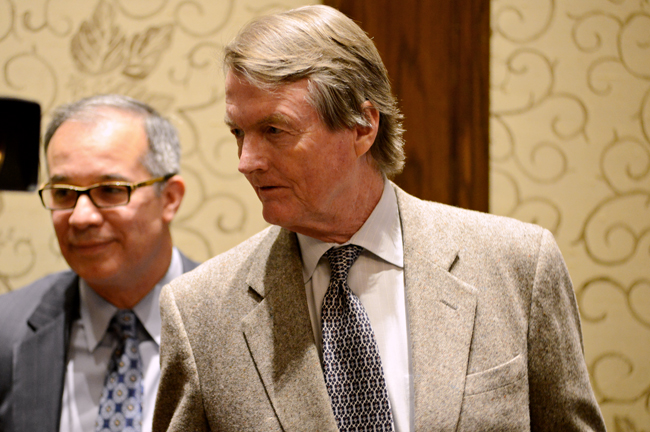Following testimony from UT System Chancellor Francisco Cigarroa and President William Powers Jr. on Wednesday, state legislators said they would be ready to make a recommendation on Regent Wallace Hall’s potential impeachment as soon as the the committee council’s report is finished.
Powers and Cigarroa testified in front of the House Select Committee on Transparency in State Agency Operations as part of an ongoing investigation into Hall’s actions in his capacity as regent. Additionally, former regents Scott Caven and John Barnhill voluntarily provided testimony of their own. Powers and Cigarroa were subpoenaed.
Hall has been accused of conducting a "witch-hunt" against Powers and overstepping his role as a regent. According to University officials, Hall filed open records requests for more than 800,000 pages of information over the last year. At a committee hearing in November, UT System lawyers testified Hall was given documents containing information protected by federal privacy laws, which he subsequently shared with his private attorney.
If the committee does decide to issue articles of impeachment, Hall will be the first state employee appointed by the governor to be impeached in Texas history.
When pressed repeatedly to quantify the cost of Hall's many requests by state Rep. Four Price, R-Amarillo, Powers said Hall's actions cost the University well over $1 million, but he insisted he could not give an exact number at that time.
The hearing took place following a tense UT System Board of Regents meeting last week, where the regents discussed Powers’ employment status, among other topics, in a closed executive session that lasted for four-and-a-half hours. At the end of the session, Cigarroa recommended Powers remain president at UT despite what he called a "strained" relationship between Powers and the System.
In his testimony Wednesday, Powers said the controversy between himself and the board has been a "tremendous distraction and hindrance" to the University's future. He said the instability created by these issues has had a negative impact on UT's academic recruitment and retention.
"We are an institution that depends on talent and recruiting the very best people to the campus," Powers said. "This has done significant harm to our reputation in the academic world nationally and internationally."
Powers said that he had not had a conversation with Hall — beyond causally greeting him in passing — in over six months. Hall declined the committee's invitation to testify tomorrow, and has stated through his attorneys that he will only do so in the future if a subpoena is issued. Though the committee issued a subpoena to Hall at their last meeting in November, they dropped the subpoena the same day.
"Mr. Hall has said time and time again that he was anxious and more than willing to tell his side of the story," said state Rep. Carol Alvarado, D-Houston and committee co-chairwoman. "I believe he could have provided this committee with matchless testimony that would have helped us set the record straight. Transparency requires cooperation. As my co-chair and I have stated, our invitation to Regent Hall to testify still stands."
At the hearing, Cigarroa said Hall's actions were disruptive to the System and took a toll on its employees, although he made a point to mention that the requests did not "paralyze the system."
"Over the past years there have been distractions, in the sense of what [the committee] has been deliberating on," Cigarroa said. "The reason [Hall's actions] were painful for me, as the chancellor of the UT System, is that I had to see morale drop."
Several committee members referenced alleged requests by Hall for information about Power's personal travel expenses. Cigarroa said such information requests were "not appropriate." Cigarroa also said that Hall has shown an unusual focus on UT-Austin, as compared to his interest in — and records requests reguarding — other UT institutions.
"Scientifically, if you look at a bell curve or scatter plot, the number of requests from Regent Hall fall way out of the norm," Cigarroa said. "I would say Regent Hall has an insatiable appetite for data and many, many, many questions."
The committee also heard testimony from former regents Caven and Barnhill, as the members tried to determine the appropriate role of a regent. Both regents said that in their tenure, they could not recall a regent acting as independently from the rest of the board as Hall has done recently.
At a specially called meeting in October, newly elected board Chairman Paul Foster said he intends to recommend changes to existing policy about the board's responsibilities regarding transparency.
"I'm an individual with a philosophy of continual improvement — there has to be a better way of doing this," Cigarroa said at Wednesday's hearing. "I am very supportive of [Foster's] proposal."
Cigarroa and Powers both stated that they were optimistic about the future and Cigarroa said he considered last week's Regents meeting to be a turning point.
"I think that we are on the precipice of this board beginning to heal — it's been through a rough time," Cigarroa said.




















